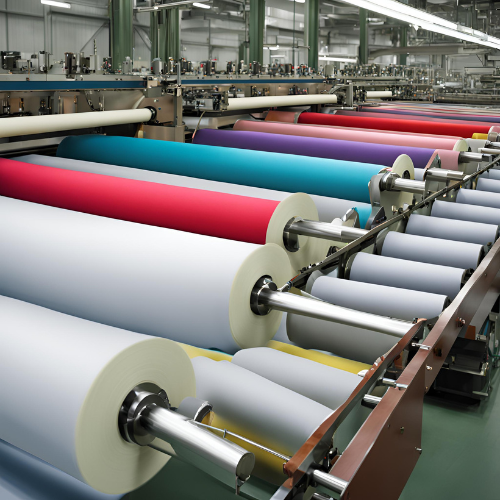
Introduction to Rubber Rollers
Rubber rollers are critical components utilized across various industries, serving as essential tools in numerous applications such as printing, packaging, and manufacturing. These rollers are typically crafted from rubber materials that provide elasticity and durability, which are vital attributes in ensuring optimal performance in diverse operational contexts. The functionality of rubber rollers extends beyond mere mechanical support; they play a pivotal role in enhancing the quality and precision of the processes they are integrated into.
Choosing rubber rollers that are suited to specific tasks is paramount for any operation. The significance of this selection process cannot be overstated, as the appropriate rubber roller directly influences the efficiency, effectiveness, and overall output of production systems. For instance, the right rubber roller type can determine how materials are handled, influencing factors such as pressure, friction, and wear during operations. This selection process is inherently linked to several key considerations including the specific requirements of the application, the unique characteristics of the materials being transported or processed, and the operational environment.
Furthermore, the choice of rubber roller material selection plays a vital role in performance outcomes. Different rubber compounds offer distinct properties such as hardness, resistance to abrasion, and thermal stability. Hence, industries must carefully assess their needs to identify the best rubber rollers that deliver reliability and durability suited for their specific applications. In this context, understanding the various rubber roller types available in the market also becomes essential, enabling businesses to make informed decisions that support enhanced operational efficiency and productivity. The importance of selecting the right rubber rollers is integral to achieving desired results, fostering a deeper understanding of its impact within various industrial operations.
Key Factors to Consider in Rubber Roller Selection
Choosing the right rubber roller for your specific industry involves several critical factors that can significantly influence the performance and longevity of the roller. One of the primary considerations is the rubber roller material selection, which dictates how well the roller will perform under different operational conditions. Various materials are available, each tailored to specific applications. For instance, nitrile rubber rollers are optimal for environments where oil resistance is a prerequisite, while silicone rubber rollers excel in high-temperature situations. Understanding these distinctions will help in selecting the best rubber rollers for industries requiring specialized functionality.
Another vital aspect to consider is the durometer hardness of the rubber. Durometer measures the hardness of rubber on a scale, and it directly affects the roller’s performance characteristics. A softer roller can provide better traction and absorb shock, while a harder roller is typically more durable and can handle heavier loads. Selecting a roller with the right hardness ensures optimal performance in alignment with the specific needs of the application.
Additionally, load-bearing capacity is a key factor when assessing potential rubber roller types. The chosen rollers must adequately distribute weight and pressure, preventing material deformation or failure under operational stress. Compatibility between various roller designs and industry applications is also essential; understanding how different configurations will interact with machinery and materials will help determine the most suitable options.
Potential users should thoroughly evaluate these parameters, taking into account the specific demands of their operations, to make informed decisions when choosing rubber rollers. Practical advice includes consulting with manufacturers for recommendations based on industry standards and performance benchmarks, ensuring that the selected roller material and type align closely with application requirements.
Industry-Specific Rubber Roller Requirements
Different industries exhibit unique specifications and standards when it comes to selecting rubber rollers, which are vital components in various manufacturing processes. Understanding the particular requirements for each industry is essential for ensuring optimal performance and productivity, as well as longevity of the equipment.
In the packaging industry, the focus lies primarily on achieving high precision and maintaining a smooth surface. Packaging applications often necessitate rubber rollers that can handle varying materials and thicknesses while providing consistent tension and speed to prevent any disruptions in the workflow. Using high-quality rubber roller types designed for packaging can greatly enhance the wrapping process. Additionally, the surface finish of these rollers should be appropriate to eliminate defects during the packaging operations.
The textile industry, on the other hand, requires rubber rollers that can withstand elevated temperatures during fabric processing. Heat-resistant rollers made from specialized rubber materials are essential to prevent deformation and degradation when exposed to heat sources, such as dyeing and finishing equipment. Choosing the right rubber roller material selection is crucial for ensuring that rollers maintain their integrity and performance under demanding conditions.
In the printing industry, the requirements shift toward achieving high-quality rollers that enable accurate color transfer. Manufacturers often seek rollers that minimize ink wastage and ensure uniform application across surfaces. Understanding the best rubber rollers for industries like printing allows for better color consistency and operational efficiency. Durability and the ability to maintain precise tolerances are also critical for rollers utilized in printing machinery, as they directly influence the final product quality.
By considering these unique industry-specific needs, businesses can identify the ideal rubber roller types and materials that align with their operational requirements. This thoughtful selection process ultimately results in improved productivity and reduced maintenance costs.
The Benefits of Custom Rubber Rollers
When it comes to maximizing operational efficiency in various industries, choosing rubber rollers specifically tailored to individual machines and applications can offer numerous advantages. Custom rubber rollers are engineered to meet unique operational demands, ensuring that they fit seamlessly into existing machinery while enhancing performance. One of the key benefits of customization is the ability to select the appropriate rubber roller material selection, which is crucial for specific environments and tasks. By utilizing specialized materials, businesses can ensure that their rollers withstand extreme conditions, abrasions, and other wear factors.
The process of designing custom rubber rollers involves careful consideration of dimensions, durometer hardness, and surface texture, all of which play a significant role in the performance of the roller. These factors can be adjusted according to the particular needs of a machine or production line. For instance, the best rubber rollers for industries like printing or packaging may require particular characteristics to ensure they grip, convey, or transfer materials efficiently without slippage or damage. By engaging with manufacturers that specialize in this area, companies can achieve optimal design solutions that are specifically aligned with their operational goals.
Moreover, investing in custom-designed rollers not only leads to improved performance but also minimizes wear and tear on both the rubber roller and machinery. This reduction in wear can extend the lifespan of the equipment, resulting in lower maintenance costs and decreased downtime. Businesses can expect a return on their investment as enhanced efficiency translates to better productivity and potentially higher profit margins. Therefore, the decision to opt for custom rubber rollers tailored to specific operational requirements represents a strategic move that can yield significant long-term benefits for any business.
